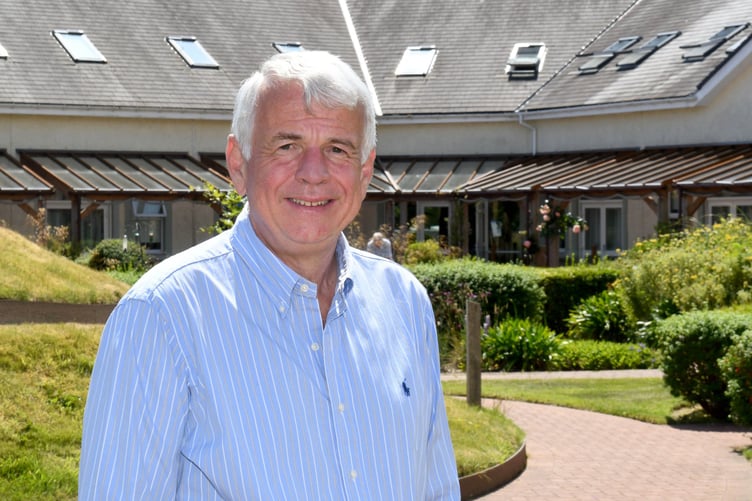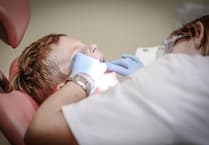From leading the team in a race to launch the world’s first 3G mobile service, to working with entrepreneurs and start ups and taking on the chairman’s role at Hospice, Chris Hall has packed a lot into his quarter century on the Isle of Man.
Not that he ever intended to stay here that long.
Chris was on a fast track with BT Europe, working in Belgium, when he was asked to come to the island to advise Manx Telecom, then wholly owned by BT, on implementing some of the technology that was bringing huge change to the telecoms landscape.
Chris recalls: ‘The head of Europe said: “We have this project from the Isle of Man. It’s two things: to introduce digital technology and set up the internet. Just go over for a few days and give them some advice”.
‘So I co wrote a business plan. What I wasn’t expecting, when I presented it to the board was for them to say: “We love your plan: would you like to come and execute it?”’
At the time, Chris says, he was ‘the classic person who thought the Isle of Man was the Isle of Wight’. But he and his wife, Mandy, decided to ‘give it a go’.
It was not the best of introductions to the island when Chris and Mandy, who was eight months pregnant, and their two-year-old daughter landed at Ronaldsway in the midst of a howling gale and lashing rain.
‘But then a couple of things happened,’ says Chris, and he goes on: ‘The first thing was the job: the job was great. Introducing broadband to the island. Setting up the internet. Setting up Manxnet. Setting up the first data centre. The job was fantastic and the people I was working with were fantastic.
‘But what we hadn’t realised is how great the community here would be, and how much we enjoyed living here. So then, when my two years here was done, my managing director, Ron Thomas, decided to retire and I was lucky enough to be appointed chief executive.
‘I think I was just under 40 and to have the opportunity to run a full fixed mobile and Internet telco was another fantastic opportunity. And it was a very interesting time for the company, because at the time, it was about getting it ready for competition.’
Up until then, Manx Telecom had been the island’s only licensed telecoms provider but change was on the horizon, and not just by way of competition from other operators.
To understand the magnitude of the change, you have to understand the telecoms landscape in those days. Mobile phones were still comparatively new and, in 2000, Manx Telecom was launching its new text messaging service which meant that, for the first time you could send written messages from your mobile phone. There were just 12 customers using broadband on the island, all of them large corporates, and the aim was to make it available to all homes and businesses.
The real Holy Grail, though, was to go one step further and make broadband services available on every mobile phone, so the drive was on to be the first to launch what the industry was calling ‘3G’.
By this time BT’s mobile operation, O2, had demerged from BT and Manx Telecom had subsequently become part of O2.
Chris says: ‘O2 saw that the future was in mobile data and 3G. And they wanted the island to be their testbed, and to roll out the network very early, so that they could learn about the deployment. Then O2 would be able to become a 3G leader around Europe.
‘So they supported us to recruit a very small project team. The regulator was fantastic and gave us the temporary licence. And we formed a partnership with NEC, who were prepared to give us the equipment free of charge.
‘So then there was a massive challenge because no one had done this before. And we were in a race with the Japanese mobile operator, Docomo, one of the biggest telecoms operators in the world.’
It might have got the juices flowing in the industry but for the general media and the wider public it was a harder sell. How do you explain a concept like this to an audience who don’t even know what an app is?
Chris says: ‘My kids now, they can’t conceive how you could live your life without apps and mobile data which of course was what 3G was all about.
‘3G laid the basic groundwork for everything that we know have in mobile communications, apps and smartphones.
‘But I think why the 3G project is still so interesting, is because it just highlights the pace of change.
‘And, in the industry certainly, it put the Isle of Man on the map. This was promising a step change so that you could access the internet anytime, anyplace anywhere and something so big in the industry brought a huge amount of attention from media all over the world.’
Chris says the media interest ‘took him out of his comfort zone.’
‘I remember standing on the Lhergy Cripperty, having to do a live interview for BBC’s Working Lunch and the instructions from O2 were “don’t mess this up for us”.’
He goes on: ‘In the end, Docomo won the race to launch by just a couple of weeks but we were still the first in Europe and I remember the headline in one of the newspapers was “Sushi 1, Kippers nil”.
‘But it was still an incredible achievement for us, a tiny team, to launch the 3G. It was good for the profile of the island and it did give us a lot of learning. The irony was that, instead of becoming the first mover, we realised that although the technology was brilliant it was going to take a couple of years to become really usable because of battery life.
‘So actually, [the reason] the project was very successful for O2 was because it helped them to get the timing right for rollout.
‘And the interesting thing is that the industry never stops. Because after 3G we had 4G and now we’re on 5g. And now there’s a lot of talk in the industry about 6G.’
In 2011, Chris was still at the helm of Manx Telecom but was thinking of a change in his business life. And it was one which would take him full circle.
He says: ‘When I first started my career at BT in 1984 my very first job was working for a small entrepreneurial technology startup within BT.
‘When I got to 50 it just felt like it was time to pass the baton on and do new things. And particularly because I loved working with small businesses and entrepreneurs it gave me a chance to get much more involved with tech, to actually get hands on involved.
‘So I took the plunge to leave time employment, and become what I think HR call “a pluralist”. And it’s actually turned out really well.
‘I really enjoy being a non-exec director, working on a much more strategic level. And I was lucky enough to get involved not just in the telecoms space, but also in different sectors. Yeah. So I did some work in the gaming sector and also in financial services, because financial services clearly have a massive use of technology.
‘And then, the bit I really enjoy is being involved in investing and advising very small startups in the technology space. That’s different from running a 300-person company but very, very exciting.’
He has also co-founded a new start up called Stacuity.
‘Just before lockdown Mike Bromwich, a super smart guy who understands telecoms and understands the internet inside out. He came up with an idea to write a software defined programmable mobile network. So instead of using the existing architecture which has been around for some time, this actually replicates it with simple, cloud-based software.
‘At the time I said to him: “That’s a great vision but I’m not sure that’s possible. But if you crack it, let me know”.
‘So during lockdown the choice for Mike was either do the garden or develop this new innovation. So he locked himself in his study and programmed. And he showed me this programme working and I thought it was amazing.
‘The network Mike’s designed is focused on what we call the Internet of Things (IoT) which is a big growth area in telecoms. There are now more mobile SIMs, in machines and devices, like medical devices and tracking devices, than there are SIM cards in mobile phones.
Mike’s programmable network allows the end user who is providing service, for example, diabetes monitor, to actually have much better security, much better functionality, and much better control over the connectivity, which allows them ultimately to provide a better IoT experience.
‘And we are very excited because, after lots of hard work and sweat and tears for the development team, we launched the service just over a week ago.’
Since 2016, Chris has also been working with Manx Telecom again, as an independent non-executive director. It is once more an exciting time for the company as it develops new subsidiary businesses like Synapse 360 and OV.
‘It’s obviously a really interesting business now and more complex,’ says Chris. ‘But one thing, which is fantastic, is to see some of the people who were quite young when I was managing director, and we ran our “Leaders of the Future” training and development programme. A number of those people are in very senior leadership positions now, and doing an incredible job.’
Chris has been involved with Isle of Man Hospice for more than 20 years. He joined the board of governors in 2008 and was asked to take over as chairman in 2019 when Sir Miles Walker stood down.
He says: ‘I accepted it, little knowing that we were on the verge of a global pandemic and a global economic crisis. So since I’ve been chairman, it’s fair to say, it’s been quite challenging. But we’ve got some fantastic support, we’ve got an incredible team, and the support of the Isle of Man community is great.
‘One of the challenges is that everyone thinks Hospice is well funded and doesn’t need support but that absolutely isn’t the case. Because we provide service totally free 24 hours a day all through the year we have to run faster and faster to raise the funds we need to enable us to provide the wonderful care which we currently do.
‘Every year the challenge gets bigger, because we’ve got rising demand and rising costs and we can’t put people on waiting lists, we have to be there at the right time.
‘It is our 40th anniversary this year and I think what motivates all of us is when you look back and see all the barriers and challenges that Nadine Crowther and the co founders overcame 40 years ago, everyone is totally committed to work even harder, and find new ways of generating more revenue so that we can survive and celebrate our 50th anniversary.’





Comments
This article has no comments yet. Be the first to leave a comment.